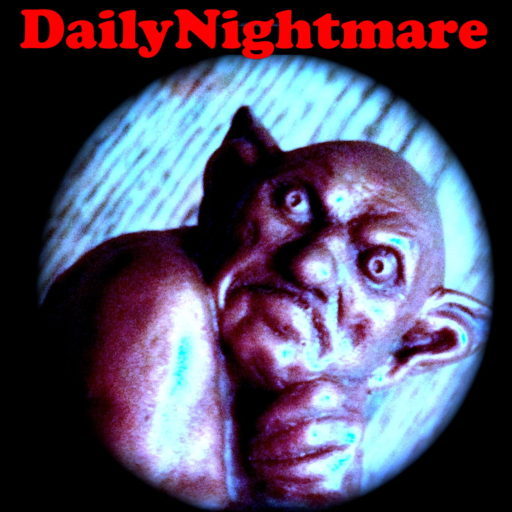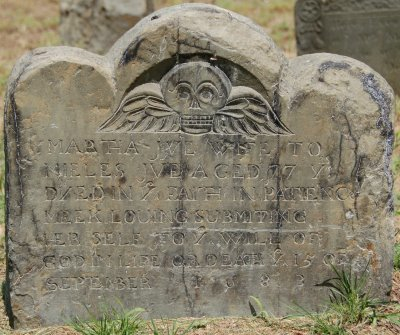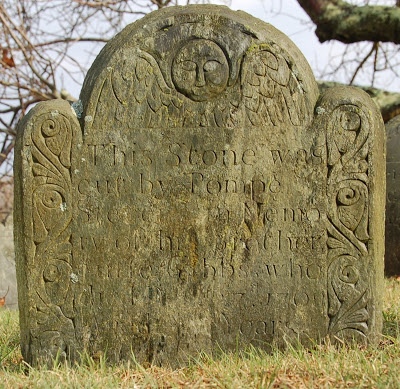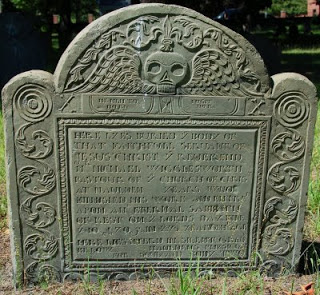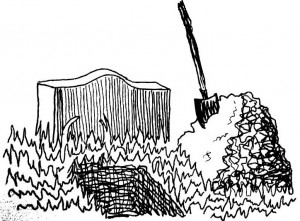 Halfway through the presentation on green burial options, I was fully creeped out but not at all by the practical and creative alternatives presented by Merilynne Rush of After Death Home Care. I was terrified by the fact of my own death in a way that was rather embarrassing. I write horror fiction, review horror culture, heck, I even collect skulls and skull-shaped sculpture. I’ve buried both my parents and, within the past four months, watched my brother-in-law die at home, at peace and surrounded by love. My earliest childhood memories are of family gatherings at the funerals of obscure relatives. I know death, right? But the photo of a hole in the ground ready for a shroud burial, a bare cavity in the earth, one without marker or protection from the elements, and I was side-swiped by the fact of my own fragility, mortality and insignificance. And this reaction really brought home the point of the presentation: how many important decisions do we make based on unexamined fears?
Halfway through the presentation on green burial options, I was fully creeped out but not at all by the practical and creative alternatives presented by Merilynne Rush of After Death Home Care. I was terrified by the fact of my own death in a way that was rather embarrassing. I write horror fiction, review horror culture, heck, I even collect skulls and skull-shaped sculpture. I’ve buried both my parents and, within the past four months, watched my brother-in-law die at home, at peace and surrounded by love. My earliest childhood memories are of family gatherings at the funerals of obscure relatives. I know death, right? But the photo of a hole in the ground ready for a shroud burial, a bare cavity in the earth, one without marker or protection from the elements, and I was side-swiped by the fact of my own fragility, mortality and insignificance. And this reaction really brought home the point of the presentation: how many important decisions do we make based on unexamined fears?
I am also no stranger to green alternatives. I’ve tended a compost pile since I was 7, grown at least some of my own food ever since and the grand “circle of life” is a potent metaphor in my imagination. Except, perhaps too often, I imagine the circle going on around me without fully realizing the realities of my own “passing away.” We don’t simply “pass away;” we leave a very corporeal residue. As a culture, we’ve fallen into certain habits for dealing with these physical remains. Embalming, I learned, became popular during the Civil War as a way to ship soldiers’ bodies home for funerals. Ms. Rush’s presentation taught me, however, that in most cases, dry ice can chill and preserve a body more than long enough for public services. Those services can be very personal affairs. Home funerals were common in this country less than a hundred years ago. The photos she showed of such home funerals– all with the complete consent of family — depicted dead persons surrounded with stuff of their lives, a guitar, a hand-decorated coffin, their own bed. The bodies looked peaceful, oddly wholesome, naturally dead without the professional interventions of a mortician. Bodies can be washed and dressed at home and the presenter noted that the task is often an opportunity for those grieving to understand and accept the reality that their loved ones are no longer there. I was surprised by how few legal requirements are actually involved and there are more in Michigan than in other states. If I understand it correctly, only two signatures are needed for a home funeral but getting those particular signatures on those particular documents during a time of grief can be a challenge. Green alternatives to conventional burial don’t just happen without a bit of forethought. The guidance of an experienced consultant like Merilynne Rush of After Death Home Care surely would be helpful.
The ecological impact of our deaths continues on long after our burial, however. Conventionally maintained cemeteries require continual investments of gasoline and attention to tend the grounds perpetually for visitors who might not ever come. Ms. Rush showed various green alternative burial places including a full conservation site that looked like a prairie dotted with saplings. And I found this image as hard to cope with as the one of a naked grave. Weird, right? I feel most alive when I am wandering that very kind of terrain. I have often joked about wishing to be composted when I die, but that humor must have masked some deeply seated fear of passing away without a trace. I found it oddly comforting that State records meticulously record the precise locations of all burial locations. I might dream of becoming as famous as Edgar Allen Poe, whose grave was visited by anonymous libation-bearing stranger every year on his birthday but seriously, is such a nebulous and unlikely dream really worth the real and predictable costs of a traditional grave? I wonder yet again, how many of my life choices are guided and constrained by such unfounded hopes and unexamined fears.
The presentation was hardly dour and grim memento mori. Merilynne exuded a peaceful, reverent demeanor, very conducive to discussing these hard options. She also played a segment of Caitlyn Doughty’s “Ask a Mortician” video podcast. We at the DailyNightmare LURV Doughty’s Order of the Good Death and have linked to her videos in the past. A little humor and good will goes a long way when dealing with such sensitive, final issues.
Are you intrigued by greener alternatives to traditional funerals and burial? If you’re in SE Michigan, you’re in luck. After Death Home Care is sponsoring a showing of the movie “A Will for the Wilderness” a feature length documentary, at the Michigan Theatre in Downtown Ann Arbor, June 1st at 1:00. The film records one man’s attempts to be treated in death according to the values he held in life. Read more at the After Death Home Care site here. in ways that better align with his values in life
Tucked away in the thumb of Michigan is an old cemetery where my people are buried. I visit it usually once or twice a year, pause in front of the stones like a solitary family reunion. My beloved grandmother who taught me how to bake bread, the grandfather I never knew, my uncle who tucked a baby chick under his jacket, my aunt who had all the cats… and also my mother and father are there. But of course, they aren’t there. They’re in my heart, my oh so perishable heart. In a hundred years, it’s unlikely many will have such memories to attach to these very permanent markers. Merilynne Rush’s presentation certainly got me thinking about how I might better request treatment in death according to the values I held in life. I was startled to find that some facets of this question seriously creep me out, a devoted horror-hound. This terror intrigues me. This Memorial Day, consider your notions of what should happen to your remains after death if for no other reason than such unexamined fears shape our behavior in life.
